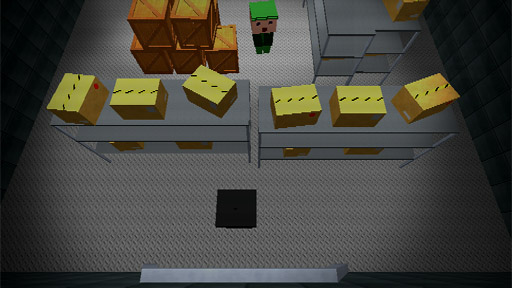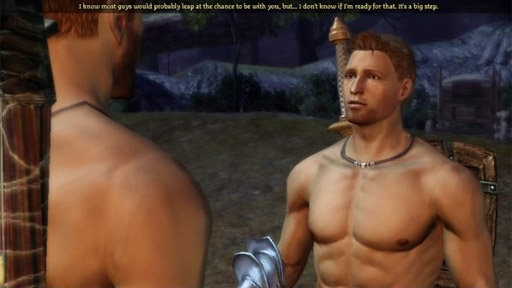Showing posts with label close reading. Show all posts
Showing posts with label close reading. Show all posts
Monday, October 4, 2010
Close Reading: Inside Job
Inside Job by Richard Perrin is a short stealth game in Unity with (what is, at least to me,) a very obvious source of inspiration that's well-executed. It's also not very difficult. Give it a shot. (from this week's TIG Source round-up)
The blocky characters and funny / fantastic static cutscene style also remind me of Increpare's Infidelidad, which is also short and easy and fun. ("NIPPLES!!")
Spoiler thoughts after the jump!! (No, seriously, just play this first. It'll take you, like, all of 7 minutes.)
Tuesday, August 10, 2010
Introduction to Starcraft and Heidegger (Part 2)
(This is a two-part essay on Starcraft II and its relation to Heidegger's writing using Sirlin's excellent write-ups, for relative novices who don't play Starcraft multiplayer.)
Last time...
- I was about to lose a game of Starcraft II -- the guy had micromanaged his forces, with one army slowly but surely killing mine and another army about to attack my now defenseless base.
- I talked about Heidegger and his ideas about technology: We can't manufacture raw resources; they are created by the earth, as with coal being formed from fossils over many years, etc. However, modern technology makes us think we control these resources, through a mental construct called enframing -- the process of re-orienting ourselves to these raw resources to give the illusion of control. When we mine / store / "control" coal, it's actually just a different state of mind.
Wrong. You're thinking too narrowly. Yes, those are the raw resources within the construct of the game, discrete variables tracked by the computer -- but what about the raw resources of your opponent?
Sunday, July 25, 2010
A rose by any other name...
So there was a recent Unity game revealed, "Pirates of New Horizons," and it looks pretty sweet but over at Mapcore we started being jerks and picking away at the awful, awkward-sounding title.
That got me thinking -- in contrast, "Sins of a Solar Empire" is one of the greatest video game titles ever. Here's why:
It just sounds awesome. The "S" of Sins and Solar together, the "aa" in "a" and "sol-A-r", and the "RR" in "Sola-R" and "Empi-R-e" -- in literature we call this effect "sibilance" (sss), "assonance" (vowels), and "consonance" (consonants) respectively. These combined effects make the title roll off the tongue nicely, at least with fluent American English speakers.
Thursday, July 22, 2010
The Oil Blue: how someone took all those silly panel puzzles from Resident Evil and made it interesting
What if someone took all those ludicrously involved and improbable mechanical maintenance panel puzzles from the Resident Evil series and turned it into a game? That'd be Vertigo Games' "The Oil Blue." And it's surprisingly good. (These impressions are based on the demo.)
The visual design? Purple gradients everywhere. Love it. The sound design? Buttons and panels have satisfying clicks to them. Fantastic. What about the gameplay? It's multi-tasking to the extreme. You have to press buttons to extract oil with various machines, all working at the same time.
The closest analogy I can think of? Oil drilling is like cooking a dinner for 10, as quickly as possible.
Friday, July 16, 2010
Dragon Age: Origins is the First Game About Gay Marriage + The Power of Mods
(I was waiting to see if the Escapist cared for an article pitch based on this blog post, but they didn't, so now I'm just going to ahead and post it.)
Dragon Age is the world's first commercial video game about gay marriage.
... and now with that incredibly misleading and generalizing hook, let me explain:
So I tricked Dragon Age: Origins into temporarily thinking my dude mage was female to trigger a gay romance with the dashing knight Alistair (and for anyone wanting to do the same, it works pretty seamlessly, just get the mod at Dragon Age Nexus) -- and the result was an oddly tragic playthrough with inadvertent commentary on gay marriage. (Inadvertent because I had to use a mod to get this reading of it.)
I mean, Dragon Age has plenty of other gay shit in it: lesbian dwarves, a threesome, two bisexual romance options, etc. And this is all the intentionally designed LGBT content that BioWare saw fit to implement, which isn't a complaint because this is probably as "progressive" a major commercial Western RPG has ever been. So kudos, BioWare.
But none of that "intentional" gay content compares to how rewarding I found Dragon Age when I hijacked Alistair's sexuality. So, this is how a gay romance with Alistair goes (minor spoilers await -- then you'll get another warning about major spoilers):
Saturday, July 10, 2010
On Game Reviews + Games Writing + Sports Writing Is Cool
Did anyone else read the "Blacklight: Tango Down" review at Eurogamer? My god. I mean, I don't intend to bite the hand that feeds me, and I definitely don't want to defend a game I haven't played / looks mediocre anyway, but I'm afraid I'm going to have to risk an ungrateful nibble here:
Must game controls necessarily feel responsive, or can they be "sticky," whatever that means, by design? (e.g. in Team Fortress 2, the Heavy's slower aiming / movement when firing the minigun) Would you criticize the Heavy Weapons class for moving too slowly, or the Scout for moving too quickly, or the player character in the Graveyard for handling like a shopping cart -- when it is all by design?
If a playtester ever told me that the "sprint feels a bit sticky" or that I had to "tighten up the graphics", I'd probably stickily sprint off to the front of the nearest speeding bus.
But here's the part of the review that originally got me thinking, "what the hell is he talking about?!"...
"All the major functions are present, correct and mapped exactly where you'd expect to find them."So it copied Halo's control scheme on the X360 -- or, as we would say in PC-land, it has keyboard bindings! Awesome.
"The sprint feels a bit sticky..."I don't know what this means. When you sprint, you stick to surfaces? When you sprint and let go of the button, you continue to sprint? When you sprint, sticks fly out of your screen and poke you in the eye?
Must game controls necessarily feel responsive, or can they be "sticky," whatever that means, by design? (e.g. in Team Fortress 2, the Heavy's slower aiming / movement when firing the minigun) Would you criticize the Heavy Weapons class for moving too slowly, or the Scout for moving too quickly, or the player character in the Graveyard for handling like a shopping cart -- when it is all by design?
If a playtester ever told me that the "sprint feels a bit sticky" or that I had to "tighten up the graphics", I'd probably stickily sprint off to the front of the nearest speeding bus.
"... but the genre basics are pretty much as they should be."By using the word "but" after talking about sticky sprinting, the reviewer flags this as a compliment. I thought the problem was that this game was too average, and now suddenly it's good that this game follows conventions? And why is it necessarily a strength that the game keeps to "genre basics"? The tone of this review keeps going back and forth between "not different enough from AAA games" and "not similar enough to AAA games." Which is it?
"... it's only really co-operative in the sense that you're playing alongside other people."I understand what the reviewer means, but still -- this is an amazingly dumb thing to say because cooperative play means... well, playing alongside other people. It's like saying "it's only singleplayer in the sense that you play by yourself."
But here's the part of the review that originally got me thinking, "what the hell is he talking about?!"...
Tuesday, June 8, 2010
A Decision of Wasted Opportunity
Via Play This Thing comes "A Decision of Paramount Importance" by Thomas Lui. (WARNING: Some spoilers await, take 5 minutes to play it first...)
Patrick Dugan at Play This Thing already sums up some of the better features of the game -- it plays on a cool adventure game trope, the timer adds a nice touch of urgency and the art style / choice of middleware was smart. The primary weakness is how much of a binary it is, and how unrealistic the game is -- presumably the real-life situation would be much grayer than "oh my god what are all these beer cans and drugs doing here."
However, where I think this game really goes wrong is the player character.
Monday, December 14, 2009
How to Close Read Video Games
 Novels, poems, plays, short stories -- they all communicate meaning through the ways they use language and how the reader perceives the work as a whole. Even though they are fixed, static texts, vastly different readings and experiences are possible.
Novels, poems, plays, short stories -- they all communicate meaning through the ways they use language and how the reader perceives the work as a whole. Even though they are fixed, static texts, vastly different readings and experiences are possible.Is Hamlet sane, or is he secretly crazy even though he thinks he's sane? (After all, crazy people rarely think they're crazy.) Both sides (among others) have been argued, yet it's all focused on the same text. The difference is that you, personally, will find one reading more convincing than the other.
Games, meanwhile, communicate meaning through the ways they use gameplay mechanics and how the player perceives the work as a whole. Even though many of them are fixed, static spaces with only so many choices / branches, vastly different playthroughs and experiences are possible.
Subscribe to:
Posts (Atom)





